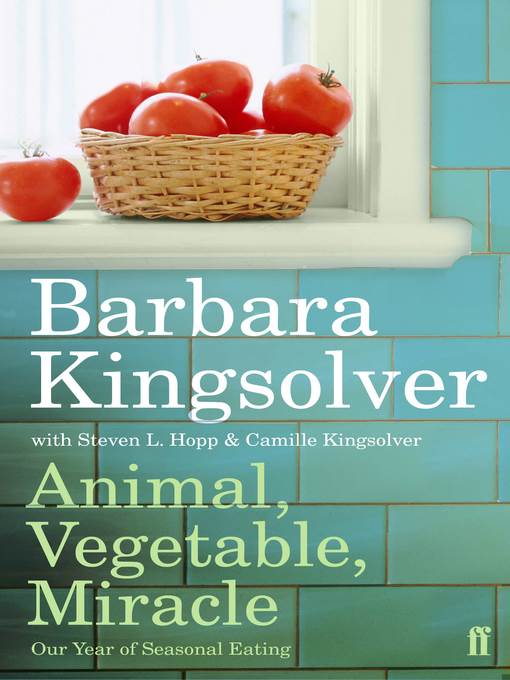
Animal, Vegetable, Miracle
Our Year of Seasonal Eating
کتاب های مرتبط
- اطلاعات
- نقد و بررسی
- دیدگاه کاربران
نقد و بررسی

Starred review from March 26, 2007
Reviewed by Nina Planck
Michael Pollan is the crack investigator and graceful narrator of the ecology of local food and the toxic logic of industrial agriculture. Now he has a peer. Novelist Kingsolver recounts a year spent eating home-grown food and, if not that, local. Accomplished gardeners, the Kingsolver clan grow a large garden in southern Appalachia and spend summers "putting food by," as the classic kitchen title goes. They make pickles, chutney and mozzarella; they jar tomatoes, braid garlic and stuff turkey sausage. Nine-year-old Lily runs a heritage poultry business, selling eggs and meat. What they don't raise (lamb, beef, apples) comes from local farms. Come winter, they feast on root crops and canned goods, menus slouching toward asparagus. Along the way, the Kingsolver family, having given up industrial meat years before, abandons its vegetarian ways and discovers the pleasures of conscientious carnivory.
This field—local food and sustainable agriculture—is crowded with books in increasingly predictable flavors: the earnest manual, diary of an epicure, the environmental battle cry, the accidental gardener. Animal, Vegetable, Miracle
is all of these, and much smarter. Kingsolver takes the genre to a new literary level; a well-paced narrative and the apparent ease of the beautiful prose makes the pages fly. Her tale is both classy and disarming, substantive and entertaining, earnest and funny. Kingsolver is a moralist ("the conspicuous consumption of limited resources has yet to be accepted widely as a spiritual error, or even bad manners"), but more often wry than pious. Another hazard of the genre is snobbery. You won't find it here. Seldom do paeans to heirloom tomatoes (which I grew up selling at farmers' markets) include equal respect for outstanding modern hybrids like Early Girl.
Kingsolver has the ear of a journalist and the accuracy of a naturalist. She makes short, neat work of complex topics: what's risky about the vegan diet, why animals belong on ecologically sound farms, why bitterness in lettuce is good. Kingsolver's clue to help greenhorns remember what's in season is the best I've seen. You trace the harvest by botanical development, from buds to fruits to roots.
Kingsolver is not the first to note our national "eating disorder" and the injuries industrial agriculture wreaks, yet this practical vision of how we might eat instead is as fresh as just-picked sweet corn. The narrative is peppered with useful sidebars on industrial agriculture and ecology (by husband Steven Hopp) and recipes (by daughter Camille), as if to show that local food—in the growing, buying, cooking, eating and the telling—demands teamwork. (May)
Nina Planck is the author of
Real Food: What to Eat and Why (Bloomsbury USA, 2006).

July 30, 2007
In her engaging though sometimes preachy new book, Kingsolver recounts the year her family attempted to eat only what they could grow on their farm in Virginia or buy from local sources. The book's bulk, written and read by Kingsolver in a lightly twangy voice filled with wonder and enthusiasm, proceeds through the seasons via delightful stories about the history of their farmhouse, the exhausting bounty of the zucchini harvest, turkey chicks hatching and so on. In long sections, however, she gets on a soapbox about problems with industrial food production, fast food and Americans' ignorance of food's origins, and despite her obvious passion for the issues, the reading turns didactic and loses its pace, momentum and narrative. Her daughter Camille contributes recipes, meal plans and an enjoyable personal essay in a clear if rather monotonous voice. Hopp, Kingsolver's husband and an environmental studies professor, provides dry readings of the sidebars that have him playing “Dr. Scientist,” as Kingsolver notes in an illuminating interview on the last disc. Though they may skip some of the more moralizing tracks, Kingsolver's fans and foodies alike will find this a charming, sometimes inspiring account of reconnecting with the food chain. Simultaneous release with the HarperCollins hardcover (Reviews, Mar. 26).

























دیدگاه کاربران